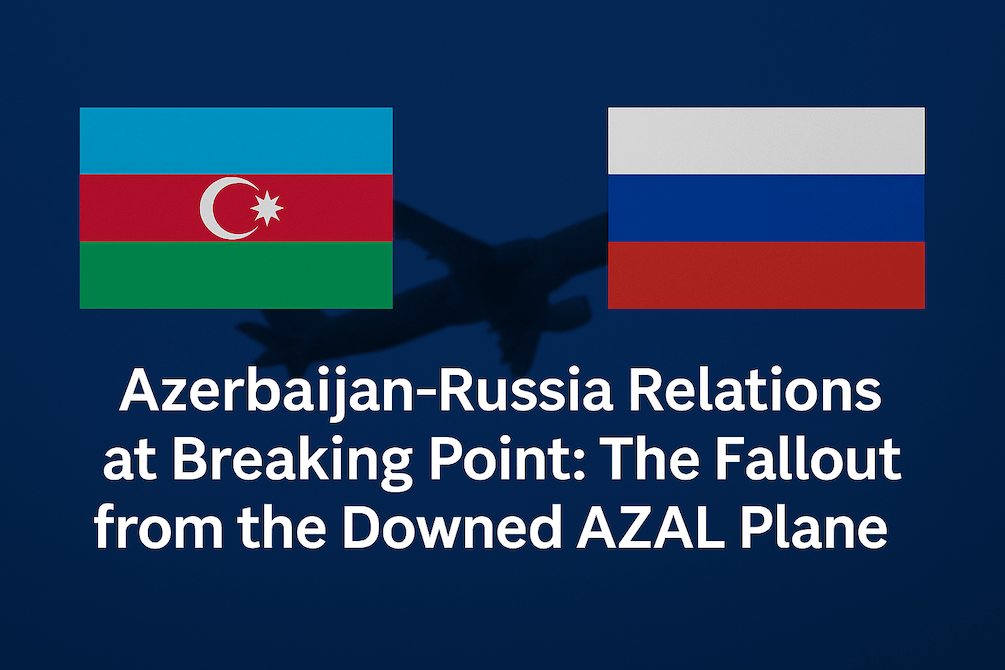By @mneniyefm
July 22, 2025 | Baku
Tensions between Azerbaijan and Russia are escalating as President Ilham Aliyev announces Baku’s intent to prepare legal documentation for international litigation over the downing of an AZAL civilian aircraft by Russian forces. This move signals a sharp turning point in the bilateral crisis that has been simmering beneath the surface for months.
From Cooperation to Confrontation
When the tragedy first occurred, Azerbaijan deliberately refrained from internationalizing the investigation. Baku excluded both the U.S. and EU from involvement, choosing instead a cooperative framework with Russia, Kazakhstan, and the International Civil Aviation Organization (ICAO). This gesture of restraint was expected to be recognized in Moscow.
According to ICAO protocols, a final investigation report should be published within one year. Only after that period can the affected party seek international legal remedies—an option Azerbaijan now openly declares it will pursue. The message to Moscow is clear: there is still time to resolve the issue diplomatically, but that window is closing.
The Aircraft Incident: Root Cause of the Crisis
President Aliyev dedicated his entire recent statement on Azerbaijani-Russian relations to the aircraft incident, underlining it as the core issue. The broader diplomatic fallout stems directly from this event.
Just three months prior to the crash, Russian President Vladimir Putin visited Baku on a state visit. That gesture came at a cost: many Western leaders declined to attend COP29 in Azerbaijan as a result of Putin’s presence—something Moscow is well aware of. Despite the diplomatic risk, Baku received Putin with full protocol, underscoring its commitment to balanced foreign policy.
Yet, Russia’s lack of substantive action since the incident has left Baku with the impression that Moscow’s attitude is essentially: “It happened—move on.” Azerbaijan, however, has refused to let the matter go.
Signals Ignored
In February, Azerbaijan shut down the Russian cultural office, Rossotrudnichestvo, as a wake-up call to the Kremlin. Moscow responded with gestures of goodwill—but none directly addressed the aircraft tragedy.
In April, a presidential envoy from Baku held high-level talks in Moscow. Azerbaijan communicated its expectations clearly. Still, no meaningful progress followed.
As a result, President Aliyev skipped the Victory Day parade in Moscow on May 9. However, Azerbaijani special forces did participate, symbolizing that Baku continues to respect the shared legacy of World War II, even as bilateral relations fray.
Throughout this period, Russian media outlets—allegedly directed by Kremlin official Alexei Gromov—launched personal attacks against President Aliyev. Azerbaijani media, in turn, began referencing President Putin in retaliatory coverage, mirroring past responses to similar provocations from Iran.
Escalation Across the Board
The situation reached new lows following the deadly incident in Yekaterinburg and other developments that rapidly strained relations across multiple fronts. Symbolic gestures from Moscow, including those via the Minister of Emergency Situations, failed to resonate in Baku because they sidestepped the core issue: the downed aircraft.
For relations to stabilize, Russia must take responsibility—by punishing those involved, issuing an apology, and offering compensation. Without this, more crises are inevitable.
A Dangerous Cycle
Azerbaijan is increasingly convinced that provocations against it are not being curbed by the Kremlin. On the contrary, Baku believes they may be receiving tacit approval. Such actions, if left unchecked, only invite retaliation, feeding a dangerous cycle of escalation.
Still, there is a path back. The Azerbaijani government, while unwavering in its principles, remains open to constructive solutions. As officials in Baku emphasize, the decision now lies with the Kremlin: escalate further, or choose de-escalation.
The time to decide is running out.


